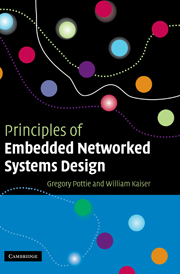Book contents
- Frontmatter
- Contents
- Preface
- Acknowledgments
- List of Abbreviations
- 1 Embedded network systems
- 2 Representation of signals
- 3 Signal propagation
- 4 Sensor principles
- 5 Source detection and identification
- 6 Digital communications
- 7 Multiple source estimation and multiple access communications
- 8 Networking
- 9 Network position and synchronization services
- 10 Energy management
- 11 Data management
- 12 Articulation, mobility, and infrastructure
- 13 Node architecture
- 14 Network data integrity
- 15 Experimental systems design
- 16 Ethical, legal, and social implications of ENS
- 17 Design principles for ENS
- Appendix A Gaussian Q function
- Appendix B Optimization
- Index
16 - Ethical, legal, and social implications of ENS
Published online by Cambridge University Press: 10 August 2009
- Frontmatter
- Contents
- Preface
- Acknowledgments
- List of Abbreviations
- 1 Embedded network systems
- 2 Representation of signals
- 3 Signal propagation
- 4 Sensor principles
- 5 Source detection and identification
- 6 Digital communications
- 7 Multiple source estimation and multiple access communications
- 8 Networking
- 9 Network position and synchronization services
- 10 Energy management
- 11 Data management
- 12 Articulation, mobility, and infrastructure
- 13 Node architecture
- 14 Network data integrity
- 15 Experimental systems design
- 16 Ethical, legal, and social implications of ENS
- 17 Design principles for ENS
- Appendix A Gaussian Q function
- Appendix B Optimization
- Index
Summary
It is trite to observe that technology can be used for good or ill. However, technology is rarely neutral in promoting one or the other. Particularly for information technology, the values that inform its design can have profound consequences for how it is used and thus for the societies that come to rely upon it. This chapter explores the ethical, legal, and social implications (ELSIs) of ENS. Section 16.1 gives background information on the government and regulation of technology. Section 16.2 discusses, in particular, how computer networks are regulated, with examples concerning intellectual property, security, and privacy. Section 16.3 discusses how ENS raise the regulatory stakes through the more intimate connection of computer networks to the physical world. A number of dystopian and utopian futures are presented, and one possible path towards selection of the latter suggested.
Technology and society
Ethics
Ethics relate to the question of right versus wrong, and the numerous shadings in between when confronted with multiple options. Sometimes the issues can be very clear, e.g., cost cutting a safety device to the point that the public is endangered is obviously wrong. Usually the choices are not so clear. It is often difficult to predict what the consequences of a particular decision or set of decisions will be. In this case, ethics demands that a process be put in place to attempt to come to the best practicable answer given the facts and resources.
Information
- Type
- Chapter
- Information
- Principles of Embedded Networked Systems Design , pp. 475 - 493Publisher: Cambridge University PressPrint publication year: 2005
